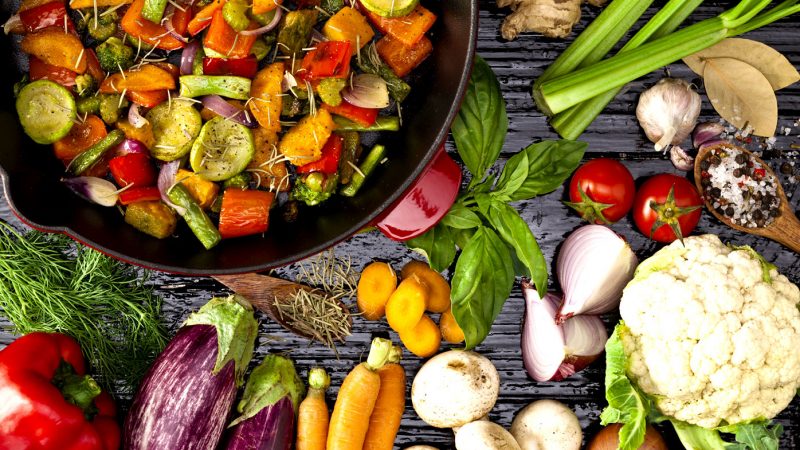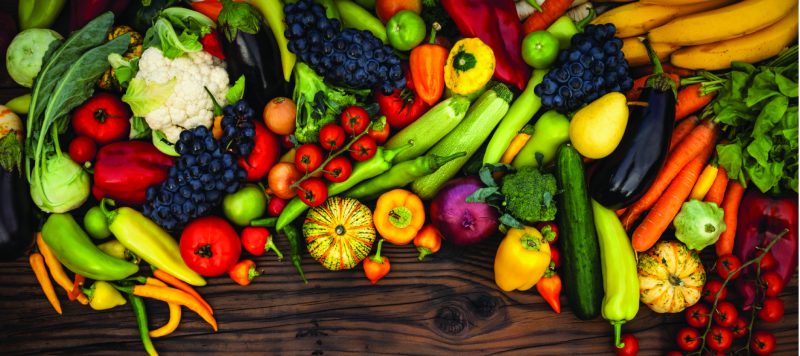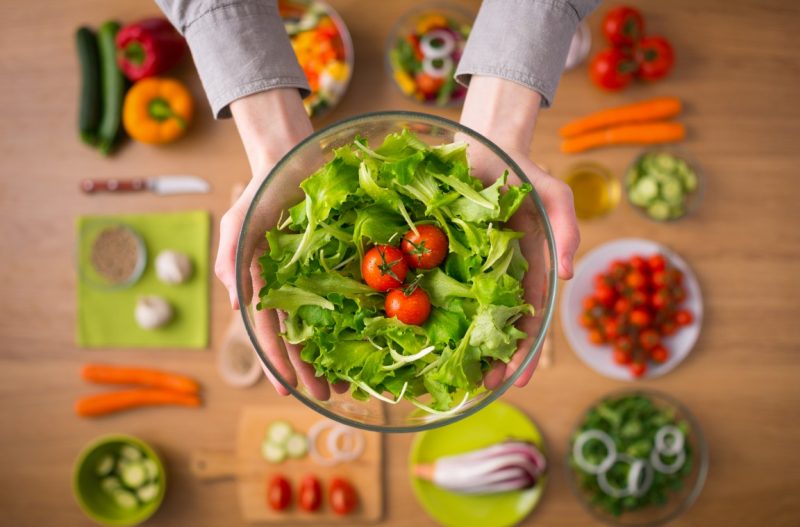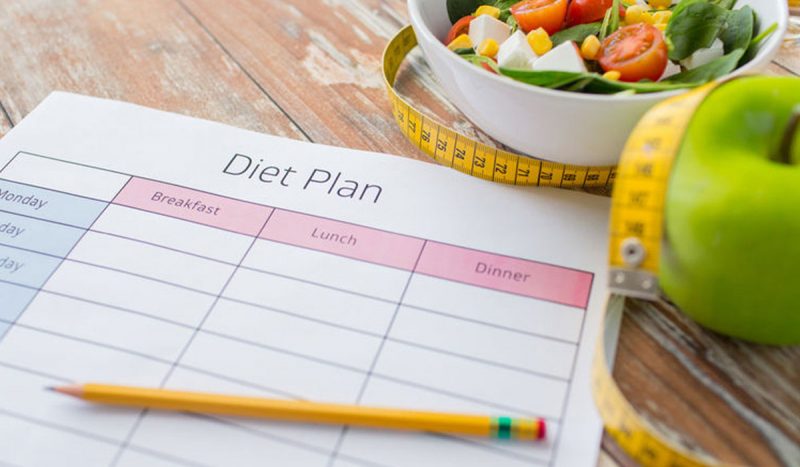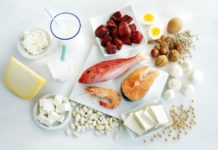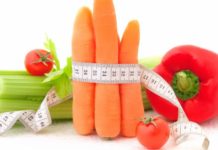A balanced and well-chosen vegetarian diet can help you lose at least 3 kg per week. In addition to losing excess weight, many note that while following a diet, they feel lightness throughout the body.
Material Content:
The rules and features of a vegetarian diet
Most doctors and nutritionists quite rightly argue that a vegetarian diet for weight loss improves the body, as it limits the use of harmful fats and cholesterol. The main principle of this method of nutrition is the use of plant products with a large amount of dietary fiber, nutrients and vitamins.
Medical studies confirm that convinced vegetarians are much less likely to suffer from high blood pressure, and they rarely have cancer and heart attacks.
This diet is aimed at the process of natural fat burning. In order to calculate the amount and calorie content of cooked dishes, a kitchen scale is needed.
Vegetarian diet food is based on the following rules:
- refusal of frying as a way of cooking;
- moderate use of salt, spices and seasonings;
- the use of a large amount of liquid (about 2 liters per day);
- strict restriction of sweets.
This diet does not imply complete or even partial starvation. You can eat hearty and at the same time lose weight. Weight loss occurs gradually. It is best to adhere to such a diet in the summer, when the warmth and plenty of fresh fruits and vegetables. In the cold season, the body needs more nutritious and high-calorie foods.
Benefits and negative points
Benefits of plant foods:
- Reducing the risk of diabetes, oncology and diseases of the heart and blood vessels.
- Zero chance of infection of the body with Escherichia coli and Salmonella.
- Improvement of blood circulation.
- Providing the body with folic acid, antioxidants, minerals, vitamins.
- Normalization of weight.
- Cleansing the intestines from toxic substances.
- Improving the well-being of the immune system.
Of course, there are also negative points:
- Plant protein is absorbed much more slowly, and only half absorbed.
- The complete absence of animal fats increases the likelihood of anemia and calcium deficiency. To prevent this, you need to constantly monitor the quality of food.
- The lack of dairy products can often provoke problems on the part of the nervous and hematopoietic systems.
- Excessive intake of fiber and legumes can sometimes lead to bloating.
There are a lot of different nuances. The main problem is this: to provide a complete and varied diet without meat products, considerable funds are needed. Of course, you can eat only cereals and cheap seasonal vegetables, but this is unlikely to benefit the body.
It's all about the complete transition to vegetarianism. If this is just a diet for several days or a week, then there will be no harm from this method of nutrition. It will only help to lose weight and cleanse the body of toxins and toxins. Many note that skin condition, complexion improve, vigor, endurance appear, and working capacity improves.
What varieties of vegetarianism exist
The prefix "veg" means "without meat." However, in vegetarianism itself there are several groups with their own ideology and lists of allowed products.
The two most common ideologies:
- veganism is the complete exclusion of animal products, including eggs and milk. Nutritionists argue that this type of nutrition is very, very harmful;
- vegetarianism - the absence of cattle meat in the diet. As a rule, the menu of adherents of this ideology is quite diverse, so doctors often approve of it.
The most common subgroups:
- lacto - the use of milk and starting products is allowed;
- ovo - it is allowed to eat eggs and honey;
- lacto-ovo - both eggs and dairy products are included in the menu.
The reasons people go vegetarian are simple:
- one group refuses meat products purely on moral and ethical ideas;
- the second introduces such exceptions in order to strengthen the state of health.
There are many other little-known areas, for example, Frutorianism or raw food.
Allowed and Prohibited Products
The list of allowed products is very extensive:
- absolutely all the greens;
- vegetables in any form;
- all crops;
- vegetable oils;
- all fruits and berries;
- legumes;
- pasta - in limited quantities;
- bran bread.
Also, do not completely abandon eggs, cheeses, fish. Sour milk products with a low fat content are allowed.
Meat of poultry and other domestic as well as wild animals is completely excluded from the menu. You also need to limit salt, spices, a variety of seasonings, canned food.
Diet and menu for the week
Making a diet for a week is not so difficult. The menu below can be modified or supplemented to your liking. Many familiar recipes can easily be turned into vegetarian recipes by simply removing animal fats and meat from them. The list of dishes is very long: borscht, cabbage soup, soups, cereals, casseroles, salads, pancakes, stews, etc.
For each day, 4 meals are calculated - 3 full and 1 snack. The most hearty meals should be eaten at lunch: an evening meal should not be too hearty.
Menu:
Monday:
- breakfast (at about 7-8 hours) - a boiled egg, a small cheese sandwich;
- lunch (from 11 to 13) - a portion of boiled buckwheat groats with vegetable oil, beetroot salad;
- dinner (no later than 18.00) - vegetable stew without potatoes (it is too high-calorie).
Tuesday:
- the first meal is cottage cheese with slices of fruit;
- the second method - stewed potatoes with mushrooms, arugula salad with tomatoes, a slice of rye bread;
- the third is milk rice porridge.
Wednesday:
- in the morning - a salad of boiled vegetables with an egg;
- at lunch - soup with mushrooms, carrot salad;
- in the evening - cottage cheese mousse.
Thursday:
- in the morning - scrambled eggs, a glass of low-fat yogurt;
- at lunch - soup with oatmeal and vegetables, a portion of sauerkraut;
- in the evening - buckwheat in milk with dried fruits.
Friday:
- first meal - vinaigrette, testicle;
- the second method is rice porridge with vegetables;
- the third is steamed broccoli with cheese.
Saturday:
- in the morning - cottage cheese casserole with raisins;
- at lunch - peppers stuffed with vegetable mass, bread with bran;
- in the evening - vinaigrette with beans.
Sunday:
- in the morning - a magnificent omelet with a cheese sandwich;
- lunch - lean soup or borsch;
- the last meal is baked zucchini.
The portions should be small, in no case should you overeat, since then there will be no effect. Cooking is only necessary for a couple or in a boiled way, you can also stew and bake. Salads are best seasoned with lemon juice or olive oil. As an afternoon snack, you can eat any fruit, berry or vegetable smoothie, biscuit cookies, seeds, nuts with honey, drink berry jelly, yogurt, fermented baked milk or kefir. Smoothies are healthy cocktails made from shredded raw vegetables and fruits with the addition of other ingredients. They are easy to digest, and besides, they can be cooked in a couple of minutes by simply whipping the prepared ingredients in a blender.
From drinks, preference should be given to compotes and fruit drinks from home-made dried fruits, green tea, warm water with a slice of lemon or honey. Water should be drunk plenty.
Doctors often recommend a little diversification of such a menu with fish and healthy seafood, in order to prevent a deficiency of calcium and iodine.
You need to exit the diet wisely. Do not immediately pounce on fatty meats. First, you need to cook dishes on a more tender rabbit or chicken, and only then return to the usual way of eating.
To whom such a diet is contraindicated
This method of nutrition is strictly contraindicated for children of any age, as well as adolescents, pregnant and lactating women. During these periods of life, the body experiences an increased need for a variety of nutrients, a considerable part of which is found in animal products. Therefore, pregnancy and lactation are not the time for experimentation. It is rare that a doctor agrees to lead a pregnancy to a convinced vegetarian, as he will not be able to vouch for the health of the child.
The same applies to children. During the period of active growth and development, the body needs animal proteins and fats, no less than plant foods. A young growing body needs meat.
With a reasonable approach and the absence of contraindications, such a diet will only benefit. However, one should always listen to any changes in the body in order to prevent possible problems in time.


